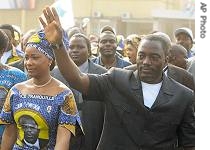 |
| Joseph Kabila and his wife Olive, left, wave to supporters as they arrive at the airport in Kinshasa, Democratic Republic of Congo, Friday, July 28, 2006 |
The announcement of official results from the Democratic Republic of Congo's first free elections in over 40 years has been painfully slow, but is nearing the halfway stage.
With figures for 78 out of 169 voting constituencies published by Congo's electoral commission, President Joseph Kabila is well ahead, with nearly 55 percent.
His nearest rival is still Jean-Pierre Bemba, a former rebel, who was made one of Congo's four vice-presidents under the peace deals that ended the 1998-2003 war that killed four million people.
If any candidate wins more that half of the votes cast during the July 30th elections, which involved 32 presidential candidates and nearly 10,000 parliamentary hopefuls, they will avoid a run-off in late October.
Despite the continued presence of thousands of Congolese and foreign rebels in the east, violent campaigning in parts of the country and a turbulent lead-up to the poll in the capital, election day passed without serious incident.
But the results have highlighted a divide in the country, with Mr. Kabila proving popular in his Swahili-speaking east, but being largely rejected by the Lingala-speaking west, where Mr. Bemba is from.
Mr. Kabila's camp is confident that he will continue to remain above the 50 percent mark.
However, if there is no second round, diplomats in the run-down and volatile capital fear a backlash by a population that believes the international community is backing Mr. Kabila, despite their rejection of him.
The world's largest U.N. peacekeeping force, backed by a one thousand-strong EU force, have been overseeing the elections, said by the U.N. to be the most expensive and complicated it has ever been involved in.
Related articles
- • Felix Tshisekedi Sworn In as DR Congo President (January 24, 2019)
- • Constitutional Court Declares Tshisekedi Winner of Presidential Election (January 19, 2019)
- • Felix Tshisekedi Vows to Be the President of All Congolese (January 10, 2019)
- • Felix Tshisekedi Elected DR Congo President (January 10, 2019)
- • DR Congo Delays Results of December Election (January 6, 2019)
- • Botswana Urges Joseph Kabila to Step Down (February 26, 2018)
- • No elections in DR Congo in December without electronic voting machines: INEC (February 13, 2018)
- • US Warns DR Congo Against Electronic Voting for Delayed Election (February 12, 2018)
- • Felix Tshisekedi accuses INEC of illegally prolonging Kabila's mandate (October 24, 2017)
- • DRC Seeks Arrest of Presidential Candidate Moise Katumbi (May 19, 2016)
- • Papa Wemba Is Buried in Kinshasa (May 4, 2016)
- • Papa Wemba Awarded Highest National Honor as Thousands Pay Tribute (May 2, 2016)
- • Rights Groups: DR Congo Must Free Pro-democracy Activists (April 13, 2015)
- • Police Open Fire on Crowd Protesting Election Law Change (January 19, 2015)
- • Etienne Tshisekedi Evacuated to Belgium for Medical Treatment (August 16, 2014)
- • Kerry Calls on Kabila to Honor Constitution (May 4, 2014)
- • Kerry in DR Congo for Security Talks (May 3, 2014)
- • DR Congo Takes Chairmanship of COMESA at Summit in Kinshasa (February 26, 2014)
- • DR Congo Honors Nelson Mandela, Hero and Model for Humanity (December 6, 2013)
- • Kabila Congratulates Congo Army for Defeating M23 Rebels (October 30, 2013)
- • DR Congo Eases Process for Starting a New Business (June 3, 2013)
- • Regional Leaders Sign DR Congo Peace Deal (February 24, 2013)
- • The M23 Rebels Want to Overthrow Kabila? Nonsense (November 28, 2012)
- • Protests Against M23 Rebels, Government and UN Spread (November 22, 2012)
- • Thousands Protest M23 Capture of Goma, Turn on Government and UN (November 21, 2012)
- • DR Congo Officials Vow to Defend Goma Against M23 Rebels (November 19, 2012)
- • At high-level meeting, Ban urges political solution to crisis in eastern DR Congo (September 27, 2012)
- • US Cuts Military Aid to Rwanda Over Support to Rebels in DR Congo (July 21, 2012)
- • DR Congo, Rwanda Sign Pact to Fight Rebels in Eastern Congo (July 15, 2012)
- • Police Investigate Former Prime Minister for Corruption (May 14, 2012)







